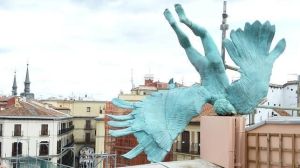
Spectaculorum plurima et varia genera edidit: iuvenales, circenses, scaenicos ludos, gladiatorium munus. iuvenalibus senes quoque consulares anusque matronas recepit ad lusum. circensibus loca equiti secreta a ceteris tribuit commisitque etiam camelorum quadrigas. ludis, quos pro aeternitate imperii susceptos appellari “maximos” voluit, ex utroque ordine et sexu plerique ludicras partes sustinuerunt; notissimus eques Romanus elephanto supersidens per catadromum decucurrit; inducta Afrani togata, quae Incendium inscribitur, concessumque ut scaenici ardentis domus supellectilem diriperent ac sibi haberent; sparsa et populo missilia omnium rerum per omnes dies: singula cotidie milia avium cuiusque generis, multiplex penus, tesserae frumentariae, vestis, aurum, argentum, gemmae, margaritae, tabulae pictae, mancipia, iumenta atque etiam mansuetae ferae, novissime naves, insulae, agri. hos ludos spectavit e proscaeni fastigio. munere, quod in amphitheatro ligneo regione Martii campi intra anni spatium fabricato dedit, neminem occidit, ne noxiorum quidem. exhibuit autem ad ferrum etiam quadringentos senatores sescentosque equites Romanos et quosdam fortunae atque existimationis integrae, ex isdem ordinibus confectores quoque ferarum et varia harenae ministeria. exhibuit et naumachiam marina aqua innantibus beluis; item pyrrichas quasdam e numero epheborum, quibus post editam operam diplomata civitatis Romanae singulis optulit. inter pyrricharum argumenta taurus Pasiphaam ligneo iuvencae simulacro abditam iniit, ut multi spectantium crediderunt; Icarus primo statim conatu iuxta cubiculum eius decidit ipsumque cruore respersit. nam perraro praesidere, ceterum accubans, parvis primum foraminibus, deinde toto podio adaperto spectare consueverat.
(Suetonius, Nero 11.1-12.2)
He gave many entertainments of different kinds: the Juvenales, chariot races in the Circus, stage-plays, and a gladiatorial show. At the first mentioned he had even old men of consular rank and aged matrons take part. For the games in the Circus he assigned places to the knights apart from the rest, and even matched chariots drawn by four camels. At the plays which he gave for the “Eternity of the Empire,” which by his order were called the Ludi Maximi, parts were taken by several men and women of both the orders; a well known Roman knight mounted an elephant and rode down a rope; a Roman play of Afranius, too, was staged, entitled “The Fire,” and the actors were allowed to carry off the furniture of the burning house and keep it. Every day all kinds of presents were thrown to the people; these included a thousand birds of every kind each day, various kinds of food, tickets for grain, clothing, gold, silver, precious stones, pearls, paintings, slaves, beasts of burden, and even trained wild animals; finally, ships, blocks of houses, and farms. These plays he viewed from the top of the proscenium. At the gladiatorial show, which he gave in a wooden amphitheatre, erected in the district of the Campus Martius within the space of a single year, he had no one put to death, not even criminals. But he compelled four hundred senators and six hundred Roman knights, some of whom were well to do and of unblemished reputation, to fight in the arena. Even those who fought with the wild beasts and performed the various services in the arena were of the same orders. He also exhibited a naval battle in salt water with sea monsters swimming about in it; besides pyrrhic dances by some Greek youths, handing each of them certificates of Roman citizenship at the close of his performance. The pyrrhic dances represented various scenes. In one a bull mounted Pasiphae, who was concealed in a wooden image of a heifer; at least many of the spectators thought so. Icarus at his very first attempt fell close by the imperial couch and bespattered the emperor with his blood; for Nero very seldom presided at the games, but used to view them while reclining on a couch, at first through small openings, and then with the entire balcony uncovered. (tr. John C. Rolfe)









